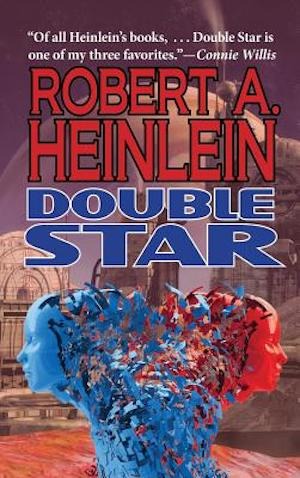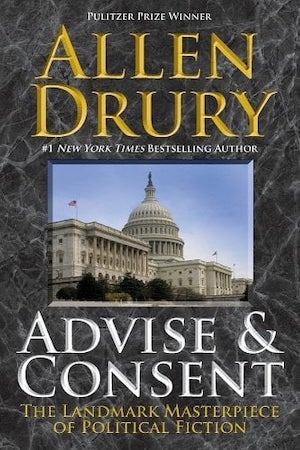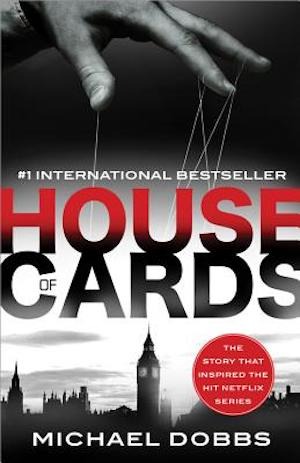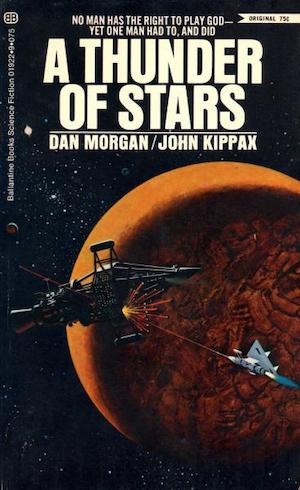
Five Novels on Political Scandal and Fraud
Embarrassing secrets and the lengths to which those in power would go to conceal them are the seeds of the plots that many writers of speculative and secular political thrillers have turned to, even before Watergate, as evidenced by the following authors:
Double Star (1956) by Robert Heinlein

Lawrence Smith, aka Lorenzo Smythe aka “The Great Lorenzo,” was a talented but underappreciated actor. His talent, obscurity, and good looks make him ideal for an obscure but history-making role: visionary statesman John Joseph Bonforte.
However, Bonforte is kidnapped and revealing this would be politically disastrous. Bonforte’s supporters resort to hiring Smith until Bonforte can be found and rescued. Smith doesn’t like the expansionist politician, but the job is his life’s role. Literally, it turns out.
One could argue that this is Heinlein’s best novel, but it’s a bit of a shame that the entire plot is designed to justify massive electoral fraud (allegedly for the greater good).
Advice and Consent (1959) by Allen Drury

Robert Leffingwell seemed a cautious candidate for Secretary of State at a time of rapprochement between the United States and the Soviet Union. The revered liberal may be seen as a pacifier by the undoubtedly paranoid right, but Leffingwell is clearly the right man at the right time to help steer the American ship of state toward sustained peace. Approval is virtually guaranteed.
Senator Cooley, determined to block Leffingwell’s appointment, takes a more detailed look at Leffingwell’s past than he does at Leffingwell’s future. Leffingwell was a member of the Communist Party branch in his youth. Can such a person be trusted in a high position? What will his supporters do to secure Leffingwell’s appointment?
The idea that the Russians might bribe top US government officials is kind of silly, but the potential for drama outweighs the plausibility. It becomes very clear that politicians may be hesitant to reveal opposition secrets because everyone has secrets. Once the cycle of retaliatory revelations begins, it’s impossible to predict how it will all play out. Sadly, in this case, it ends in tragedy.
House of Cards (1995) by Michael Dobbs

Henry Collingridge has emerged victorious in the power struggle following the ouster of Margaret Thatcher. The new Prime Minister owes his success to the support of Chief Whip Francis “FU” Urquhart. FU expects a prestigious ministerial post in return. Collingridge makes a fatal mistake and lets FU down. If the current prime minister chooses to betray FU, then FU will not just pay back.
By the nature of the position, any chief whip knows secrets that could embarrass the prime minister’s office. FU is well-informed and completely untroubled by trivial issues such as ethics. He uses his knowledge with brutal efficiency. Isn’t that enough…? Well, FU is not above well-timed murder.
Dobbs’s political thriller draws on his experiences as part of Thatcher’s regime, and it’s realistic. FU’s indifference to his treatment may have been inspired by Chief of Staff Dobbs’ own quarrel with Mrs Thatcher. Given how ruthless and methodical FU’s plans were, Mrs Thatcher may have been lucky that Dobbs decided to deal with his downfall through novel writing rather than a palace coup.
From Stellaris (1970) by Dan Morgan and John Kippax

Volume 1 of the Adventurer 12 series begins like all Star Patrol series with an extensive commissioning committee hearing to determine the best candidate for the position of Adventurer Captain. Commander Tom Bruce is clearly that guy. However, certain people want others and will gladly accept any excuse to turn Bruce down.
Bruce’s adversaries appear to have the ammunition they need when he orders the destruction of an out-of-control spacecraft. Indeed, the ship was heading to Earth, and Bruce saved millions by destroying it. However, this isn’t the first time Bruce has ordered the killing of innocents. Now his enemies have an excuse to document the events of Minos IV.
In this narrative universe, tough guys are often forced to make tough decisions, so it’s no surprise that Bruce had good reason to kill the Minos IV colonists. However, what should have been noticed but wasn’t was that Bruce’s executive officer was a former lover who planned to use her position to police which crew members slept with Bruce. I don’t see what could go horribly wrong with this.
Guardians of Isis (1981) by Monica Hughes

For decades, David London has ruled the Islamic State colony unchallenged and unrestricted. His whims became rules. His irrational dislike—for example, of Jody Como, who resembled Jody’s grandfather, who had been one of his rivals in London—influenced public policy. When crisis looms, London orders Jody to explore beyond the only known habitable valley. This is adeath sentence.
Jody survives exile and discovers that history is not quite as it is portrayed in London. Jody learns that London has lied rather brazenly about both the colony and London’s own past. Jody must now decide how to best serve the public interest with what he now knows.
London is a terrible, entrenched administrator. The book hints at a grim future for the colony (although there is a third book in the trilogy, the second of which, Guardians of Isis, should give readers some hope). Thankfully, it’s a plot point where the isolated ISIS isn’t the only world overrun by humans.
Overall, the article is well-written, but I made a few minor changes to improve clarity and readability.







Tagged 1:1 spin-orbit resonance, Earth, exoplanet, Mercury, Science fiction